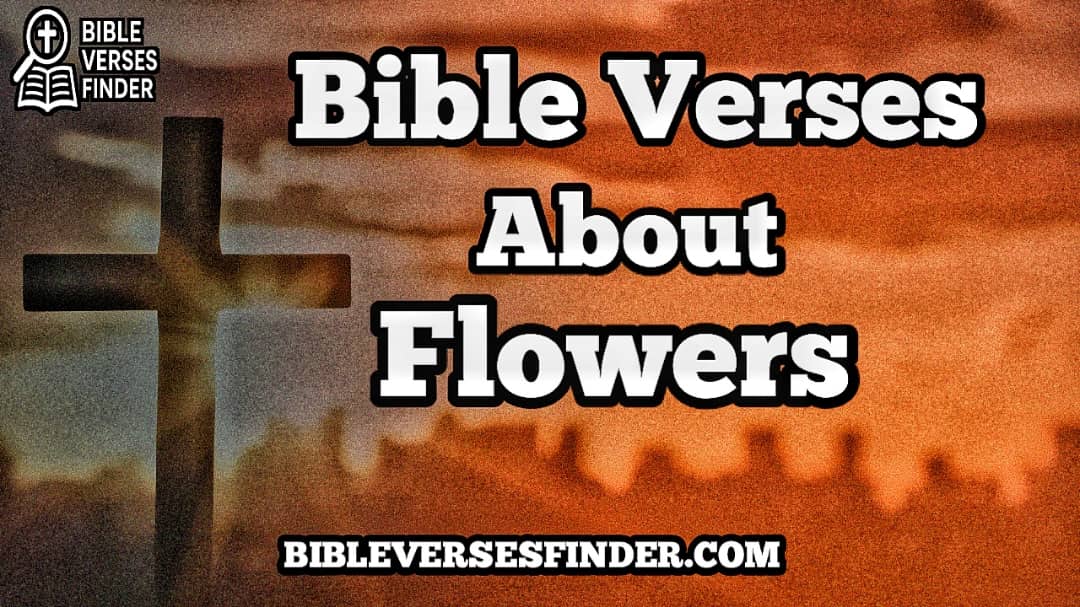Flowers are among the simplest yet most powerful symbols in Scripture. They bloom beautifully for a time, then wither away, reminding us of the fragility of life, the beauty of God’s creation, and His promise of renewal. Whether you’re drawn to lilies in the field, roses in a garden, or wildflowers that grow freely, the Bible uses flowers as metaphors for spiritual truths, pointing us toward humility, the temporary nature of life, and the eternal care of God.
Also Read: Most Beautiful Aesthetic Bible Verse Wallpaper For You

When we look at flowers, we don’t just see beauty; we see spiritual lessons blooming in color and fragrance. Let’s dive into Bible verses about flowers and uncover the profound truths they carry. We will be sharing with you all some amazing articles on Bible verses about flowers.
All I need you to do is read through this post for more understanding, so that you will know what the lord did in creation. Note that our God can be trusted and everything he does is good. This article will break everything down for your understanding.
Must Read: 18+Inspiring Bible Verses For Sports – Bible Quote
Flowers as a Symbol of Life’s Fragility
One of the strongest themes tied to flowers in Scripture is their connection to the brevity of life. Just like flowers blossom in splendor but eventually fade, human life is temporary. This imagery helps us remember the importance of humility, gratitude, and living with eternity in mind.
1. The book of Isaiah 40:6–8 (NIV): “All people are like grass, and all their faithfulness is like the flowers of the field. The grass withers and the flowers fall, but the word of our God endures forever.”
2. The book of James 1:10–11 (NIV): “But the rich should take pride in their humiliation since they will pass away like a wild flower. For the sun rises with scorching heat and withers the plant; its blossom falls, and its beauty is destroyed. In the same way, the rich will fade away even while they go about their business.”
Flowers remind us that earthly beauty and wealth do not last forever. Just as petals fall, human achievements eventually fade, but God’s Word remains unchanging and eternal.
The Beauty of God’s Creation in Flowers
Flowers are living testimonies of God’s artistry. Their colors, patterns, and fragrances are not random; they are intentional details from the Creator, teaching us about His love for beauty and order in creation.
1. The book of Song of Solomon 2:12 (NIV): “Flowers appear on the earth; the season of singing has come, the cooing of doves is heard in our land.”
2. The book of Psalm 103:15 (NIV): “The life of mortals is like grass, they flourish like a flower of the field.”
Every flower that blooms is a reminder of God’s creative heart. When you see a field of wildflowers or a single rose in bloom, you’re seeing a glimpse of His divine imagination.
Flowers as a Picture of God’s Provision
Perhaps one of the most famous moments in Scripture involving flowers is Jesus’ teaching about lilies. He used them as a metaphor for God’s care, showing that if God clothes the flowers with such splendor, He surely provides for His children.
1. The book of Matthew 6:28-30 (NIV): “And why do you worry about clothes? See how the flowers of the field grow. They do not labor or spin. Yet I tell you that not even Solomon in all his splendor was dressed like one of these. If that is how God clothes the grass of the field, will he not much more clothe you, you of little faith?”
These Bible Verses About Flowers remind us not to be anxious. Flowers don’t work for their beauty; they simply exist as God created them, and He sustains them. In the same way, we can trust that God’s provision for us will always be sufficient.
Flowers Representing Renewal and Hope
Flowers often symbolize new beginnings. From the barren season of winter comes spring, when flowers bloom again. This cycle is a vivid picture of resurrection, renewal, and hope in God’s promises.
1. The book of Isaiah 35:1–2 (NIV): “The desert and the parched land will be glad; the wilderness will rejoice and blossom. Like the crocus, it will burst into bloom; it will rejoice greatly and shout for joy.”
2. The book of Hosea 14:5 (NIV): “I will be like the dew to Israel; he will blossom like a lily. Like a cedar of Lebanon, he will send down his roots.”
NOTE: Just as flowers bloom again after harsh seasons, our lives, too, can be renewed by God’s grace. The appearance of flowers in Scripture often signals hope after despair, joy after sorrow, and life after loss.
Lessons of Humility from Flowers
Though beautiful, flowers are fragile. They remind us that human life is not about self-importance but about recognizing God’s sovereignty. Humility is one of the deepest lessons flowers teach us — that all glory belongs to God.
1. The book of 1 Peter 1:24 25 (NIV): “For, ‘All people are like grass, and all their glory is like the flowers of the field; the grass withers and the flowers fall, but the word of the Lord endures forever.’”
2. The book of Job 14:1–2 (NIV): “Mortals, born of woman, are of few days and full of trouble. They spring up like flowers and wither away; like fleeting shadows, they do not endure.”
By comparing people to flowers, Bible Verses About Flowers tells us that our beauty, fame, and accomplishments are fleeting. But when rooted in God, our lives gain eternal meaning.
Flowers in Worship and Symbolism
In many cultures, flowers have been used in worship, symbolizing offerings of beauty and fragrance to God. Though the Bible does not emphasize literal flower offerings, it uses floral imagery to describe worship and devotion.
1. The book of Isaiah 55:12 13 (NIV): “The mountains and hills will burst into song before you, and all the trees of the field will clap their hands. Instead of the thornbush, the juniper will grow, and instead of briers the myrtle will grow. This will be for the Lord’s renown, for an everlasting sign.”
Bear in mind that flowers symbolize joy, beauty, and transformation in the presence of God. They point us to the reality that worship is about offering our best, our “fragrance” of love and obedience to Him.
Flowers and the Eternal Perspective
Perhaps the deepest truth flowers reveal is the contrast between the temporary and the eternal. While flowers wither, God’s promises never fade. Flowers remind us to hold lightly to earthly things while keeping our eyes fixed on heaven.
1. The book of Matthew 6:19-20 (NIV): “Do not store up for yourselves treasures on earth, where moths and vermin destroy, but store up for yourselves treasures in heaven.” Just like flowers fade away, so do worldly treasures. But eternal life, love, and faith endure forever.
FAQ on Bible Verses About Flowers
This will clear this question you have in mind. Here are possible answers that will make your day as well. Take your time and read through for more understanding.
1. Why are flowers mentioned in the Bible?
Flowers are often used in the Bible as symbols of life’s fragility, beauty, and God’s provision. They serve as reminders of how temporary human life is compared to God’s eternal Word. At the same time, flowers reflect God’s artistry and His ability to clothe even the smallest details of creation in beauty and care.
2. What do flowers symbolize spiritually in the Bible?
Spiritually, flowers often symbolize:
- The brevity of life — our earthly existence is beautiful but short, like a flower that quickly fades (Isaiah 40:6 8).
- God’s provision — as Jesus said, God clothes the lilies of the field, showing His creation care (Matthew 6:28 30).
- Renewal and hope — flowers bloom again after winter, representing restoration and resurrection (Isaiah 35:1–2).
3. Which Bible verse talks about lilies of the field?
The most famous verse about lilies is Matthew 6:28 29, where Jesus says: “See how the flowers of the field grow. They do not labor or spin. Yet I tell you that not even Solomon in all his splendor was dressed like one of these.” This passage teaches us to trust God’s provision and not worry about material needs.
4. Do flowers represent human life in the Bible?
Yes. Several verses compare human life to flowers, emphasizing its fragility and shortness:
Psalm 103:15-16: “The life of mortals is like grass, they flourish like a flower of the field; the wind blows over it and it is gone.”
James 1:11: “The sun rises with scorching heat and withers the plant; its blossom falls and its beauty is destroyed.”
These verses highlight that while human beauty and success may fade, God’s truth and promises remain forever.
5. How do flowers show God’s care for creation?
Flowers do not labor or work for their beauty; they simply grow as God intended. Jesus used flowers as an illustration that if God takes care of such delicate creations, He will certainly provide for His children. Flowers point us to God’s faithfulness and constant provision, even in small details of life.
6. What Bible verses use flowers as a symbol of hope?
Flowers symbolize renewal, joy, and hope after hardship:
>> Isaiah 35:1–2: “The wilderness will rejoice and blossom. Like the crocus, it will burst into bloom; it will rejoice greatly and shout for joy.”
>> Hosea 14:5: “I will be like the dew to Israel; he will blossom like a lily.”
NOTE: These verses show that flowers represent transformation even in dry seasons; God can bring life and beauty again.
7. What lessons can Christians learn from flowers?
Christians can learn several lessons:
- Humility — like flowers, human glory is temporary.
- Trust — just as flowers don’t worry about their growth, we can trust God’s provision.
- Hope — flowers bloom again after difficult seasons, reminding us of God’s power to restore.
8. Are flowers connected to worship in the Bible?
While the Bible doesn’t command flower offerings in worship, it uses floral imagery to describe worship, beauty, and devotion. For example, Song of Solomon 2:1 refers to the “rose of Sharon” and “lily of the valleys,” which symbolize purity and beauty. Flowers can also represent the joy and fragrance of a life lived in praise of God.
Summary:
Flowers in the Bible are not just decorative details; they are teachers. They remind us of the fleeting nature of life, the beauty of God’s creation, the assurance of His care, and the hope of renewal. Every blossom is a living parable: life is temporary, but God’s love and promises are eternal.
So the next time you see flowers, whether in a garden, on a mountain trail, or even as a simple daisy by the roadside, pause and remember the spiritual truths they represent. Their beauty is fleeting, but the lessons they carry are everlasting. Stay with us as we keep you updated.





